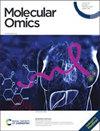Re-mining serum proteomics data reveals extensive post-translational modifications upon Zika and dengue infection†
IF 2.4
4区 生物学
Q3 BIOCHEMISTRY & MOLECULAR BIOLOGY
引用次数: 0
Abstract
Zika virus (ZIKV) and dengue virus (DENV) are two closely related flaviviruses with similar symptoms. However, due to the implications of ZIKV infections for pregnancy outcomes, understanding differences in their molecular impact on the host is of high interest. Viral infections change the host proteome, including post-translational modifications. As modifications are diverse and of low abundance, they typically require additional sample processing which is not feasible for large cohort studies. Therefore, we tested the potential of next-generation proteomics data in its ability to prioritize specific modifications for later analysis. We re-mined published mass spectra from 122 serum samples from ZIKV and DENV patients for the presence of phosphorylated, methylated, oxidized, glycosylated/glycated, sulfated, and carboxylated peptides. We identified 246 modified peptides with significantly differential abundance in ZIKV and DENV patients. Amongst these, methionine-oxidized peptides from apolipoproteins and glycosylated peptides from immunoglobulin proteins were more abundant in ZIKV patient serum and generate hypotheses on the potential roles of the modification in the infection. The results demonstrate how data-independent acquisition techniques can help prioritize future analyses of peptide modifications.

重新挖掘血清蛋白质组学数据揭示了寨卡病毒和登革热感染的广泛翻译后修饰†
寨卡病毒(ZIKV)和登革热病毒(DENV)是两种密切相关的黄病毒,具有相似的症状。然而,由于寨卡病毒感染对妊娠结局的影响,了解它们对宿主分子影响的差异是非常有趣的。病毒感染改变宿主蛋白质组,包括翻译后修饰。由于修饰的多样性和低丰度,它们通常需要额外的样本处理,这对于大型队列研究是不可行的。因此,我们测试了下一代蛋白质组学数据的潜力,以确定特定修饰的优先级以供以后分析。我们重新挖掘了来自ZIKV和DENV患者的122份血清样本的已发表的质谱,以确定磷酸化、甲基化、氧化、糖基化/糖基化、硫酸化和羧化肽的存在。我们在ZIKV和DENV患者中鉴定出246个修饰肽,它们的丰度存在显著差异。其中,载脂蛋白的蛋氨酸氧化肽和免疫球蛋白的糖基化肽在寨卡病毒患者血清中含量较高,并对该修饰在寨卡病毒感染中的潜在作用提出了假设。结果表明,数据独立的采集技术可以帮助优先考虑肽修饰的未来分析。
本文章由计算机程序翻译,如有差异,请以英文原文为准。
求助全文
约1分钟内获得全文
求助全文
来源期刊

Molecular omics
Biochemistry, Genetics and Molecular Biology-Biochemistry
CiteScore
5.40
自引率
3.40%
发文量
91
期刊介绍:
Molecular Omics publishes high-quality research from across the -omics sciences.
Topics include, but are not limited to:
-omics studies to gain mechanistic insight into biological processes – for example, determining the mode of action of a drug or the basis of a particular phenotype, such as drought tolerance
-omics studies for clinical applications with validation, such as finding biomarkers for diagnostics or potential new drug targets
-omics studies looking at the sub-cellular make-up of cells – for example, the subcellular localisation of certain proteins or post-translational modifications or new imaging techniques
-studies presenting new methods and tools to support omics studies, including new spectroscopic/chromatographic techniques, chip-based/array technologies and new classification/data analysis techniques. New methods should be proven and demonstrate an advance in the field.
Molecular Omics only accepts articles of high importance and interest that provide significant new insight into important chemical or biological problems. This could be fundamental research that significantly increases understanding or research that demonstrates clear functional benefits.
Papers reporting new results that could be routinely predicted, do not show a significant improvement over known research, or are of interest only to the specialist in the area are not suitable for publication in Molecular Omics.
 求助内容:
求助内容: 应助结果提醒方式:
应助结果提醒方式:


